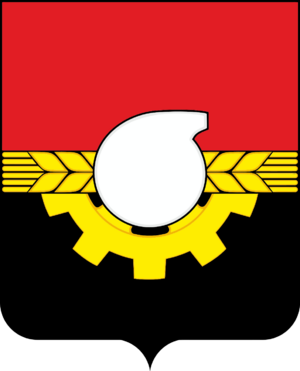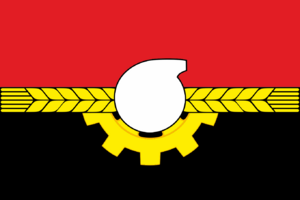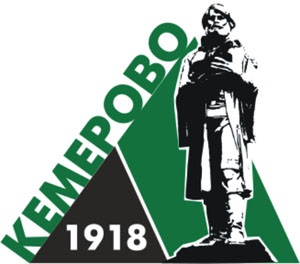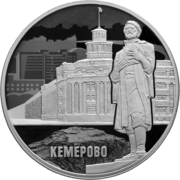Kemerovo facts for kids
Quick facts for kids Kemerovo (English)Кемерово (Russian) |
|
|---|---|
| - City - | |
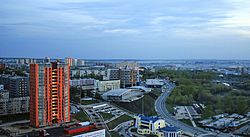 View of Kemerovo |
|
|
|
|
| City Day | June 12 |
| Administrative status | |
| Country | Russia |
| Federal subject | Kemerovo Oblast |
| Administratively subordinated to | Kemerovo City Under Oblast Jurisdiction |
| Municipal status | |
| Urban okrug | Kemerovsky Urban Okrug |
| Head | Ilya Sereduk |
| Representative body | City Council of People's Deputies |
| Statistics | |
| Population (2010 Census, preliminary) |
532,981 inhabitants |
| - Rank in 2010 | 30th |
| Population (January 2015 est.) | 549,159 inhabitants |
| Time zone | OMST (UTC+07:00) |
| Founded | May 9, 1918 |
| Postal code(s) | 650000–650004, 650010, 650014, 650016, 650021, 650023–650026, 650029, 650031–650033, 650035, 650036, 650040, 650042–650044, 650051, 650052, 650054–650056, 650060, 650061, 650064–650066, 650068, 650070, 650071, 650700, 650880, 650890, 650899, 650920, 650940–950957, 650960, 650961, 650971–650979, 650991–650993, 650997–650999 |
| Dialing code(s) | +7 3842 |
| Official website: http://www.kemerovo.ru | |
Kemerovo (Russian: Ке́мерово, IPA: [ˈkʲemʲɪrəvə]) is an important industrial city in Russia. It is the main city of Kemerovo Oblast. Kemerovo is located where the Iskitimka and Tom Rivers meet. This area is known for its large coal mining region called the Kuznetsk Basin. In 2021, about 557,119 people lived here.
The city was once called Shcheglovsk. This name was used until March 27, 1932, when it officially became Kemerovo.
Contents
- History of Kemerovo: From Villages to a City
- Etymology: How Kemerovo Got Its Name
- Economy: Industry and Jobs
- Transportation: Getting Around Kemerovo
- Education: Learning in Kemerovo
- Sport: Bandy and Speedway
- Climate: Kemerovo's Weather
- City Symbols: What Represents Kemerovo?
- Numismatics: Kemerovo on Coins
- Notable People from Kemerovo
- Twin Towns – Sister Cities
- Images for kids
- See also
History of Kemerovo: From Villages to a City
Kemerovo grew from several older Russian settlements. In 1657, a stopping point called Verkhotomsky ostrog was set up nearby. It was on a road that connected Tomsk to Kuznetsk fortress.
Early Settlements and Coal Discovery
In 1701, a settlement called Shcheglovsk was founded on the left bank of the Tom River. It soon grew into a village. By 1859, there were seven villages where Kemerovo is today. These included Shcheglovka, Kemerovo (named in 1734), and others.
Coal was first found in this area in 1721. The first coal mines opened in 1907. A chemical plant was built in 1916. By 1917, the village of Shcheglovo had about 4,000 people.
Becoming a City and Industrial Growth
The area grew even more when a railway was built. This railway connected Yurga to Kolchugino (now Leninsk-Kuznetsky). It also had a link between Topki and Shcheglovo.
Shcheglovo officially became a town on May 9, 1918. This date is now celebrated as Kemerovo's founding day. The town was then known as Shcheglovsk. In 1921, the Kuzbass Autonomous Industrial Colony was set up here. About 650 workers from 20 different countries came to live and work. They helped build what became the Kemerovo Coke Chemical Plant. On May 27, 1932, Shcheglovsk was renamed Kemerovo. In 1943, it became the main city of Kemerovo Oblast.
Etymology: How Kemerovo Got Its Name
The city of Kemerovo is named after an old village. This village was named after the first settlers, the Kemerovs. The "ovo" ending in the name often means it came from a person's name. The village then gave its name to the Kemerovo mine that started there.
In 1925, the city of Scheglovsk was formed by combining two nearby villages: Kemerovo and Scheglovo. In 1932, Scheglovsk was renamed Kemerovo, taking the name from the mine.
Another idea is that the name comes from a Turkic word, kemer. This word means "cliff, coast, or steep bank." People who live in Kemerovo are called Kemerovochanin (male), Kemerovochanka (female), or Kemerovochane (plural).
Economy: Industry and Jobs
Kemerovo's growth has always been linked to coal mining and heavy industry. This is because there is a lot of coal available in the area. It is still an important industrial city. During the time of the Soviet Union, many factories were built here. These included plants for steel, aluminum, and machinery. There were also chemical and fertilizer factories.
After the Soviet Union ended, some of the city's industries faced challenges. However, major companies like Siberian Business Union are still based in Kemerovo.
Transportation: Getting Around Kemerovo
Kemerovo has a good public transport system.
Public Transport Options
The city has many ways to get around:
- Over 70 city bus routes and 63 suburban routes.
- 53 public taxi routes.
- 5 tram routes and 9 trolleybus routes.
Every day, about 686 public transport vehicles are on the city streets. This includes 201 buses, 364 route taxis, and 121 electric vehicles (trams and trolleybuses). As of March 24, 2019, a ride on public transport cost 20 rubles. Some trams in Kemerovo even offered free Wi-Fi to encourage more passengers.
Air and Rail Travel
The city has its own airport, Kemerovo International Airport. It is located about 2.5 kilometers southeast of the city. The airport has one runway that is 3200 meters long. It is named after Alexei Leonov, a famous Russian cosmonaut from the Kuzbass region. You can get to the airport by bus using routes 101 and 126.
Kemerovo is also connected to western Russia by a branch of the Trans-Siberian Railway. The city has its own train station, the Kemerovo Railway station.
Education: Learning in Kemerovo
Kemerovo is home to several important higher education institutions. Students can choose from six universities and institutes:
- Kemerovo State University
- Kuzbass State Technical University
- Kemerovo Institute of Food Industry (University)
- Kemerovo State Medical Academy
- Kemerovo State Institute of Culture
- Kemerovo Agricultural Institute
- Kuzbass Economy and Justice Institute
Sport: Bandy and Speedway
Sports are very popular in Kemerovo, especially bandy. Bandy is a team sport played on ice, similar to ice hockey but with a ball.
Bandy: A Popular Winter Sport
Many people in Russia love bandy. In 2011, 26,000 fans watched the opening game of the Russian Bandy League in Kemerovo. The local team, Kuzbass, played against Dynamo Moscow. Kuzbass is one of the top teams in the league.
Kemerovo hosted the 2007 Bandy World Championship. The city has the first stadium in Russia built especially for bandy. This stadium has artificial ice, which helps develop the sport. Kuzbass plays its league matches at Khimik Stadium, which can hold 32,000 people.
Since 2013, there has been a "bandy on boots" tournament. This event is for different national groups living in the Kuzbass region.
Motorcycle Speedway
The Kuzbass Kemerovo motorcycle speedway team was also very successful. They competed in the Soviet Union Championship from 1968 to 1992. The team won silver medals in 1988 and bronze medals in 1986 and 1987. Sometimes, ice speedway races are held at the Mototrack Rosto DOSAAF.
Climate: Kemerovo's Weather
Kemerovo has a humid continental climate (Köppen Dfb). This means it has warm summers and long, very cold winters.
Temperature and Precipitation
The average temperature in January is about -17°C (1°F). In July, the average temperature is around 19°C (66°F). The city gets about 525 millimeters (20.7 inches) of rain and snow each year.
| Climate data for Kemerovo (1991–2020, extremes 1955–present) | |||||||||||||
|---|---|---|---|---|---|---|---|---|---|---|---|---|---|
| Month | Jan | Feb | Mar | Apr | May | Jun | Jul | Aug | Sep | Oct | Nov | Dec | Year |
| Record high °C (°F) | 6.0 (42.8) |
6.8 (44.2) |
14.6 (58.3) |
30.2 (86.4) |
34.4 (93.9) |
35.7 (96.3) |
38.0 (100.4) |
36.3 (97.3) |
33.1 (91.6) |
24.5 (76.1) |
13.8 (56.8) |
5.8 (42.4) |
38.0 (100.4) |
| Mean daily maximum °C (°F) | −12.7 (9.1) |
−8.7 (16.3) |
−0.4 (31.3) |
9.6 (49.3) |
18.6 (65.5) |
23.9 (75.0) |
25.7 (78.3) |
23.1 (73.6) |
15.9 (60.6) |
7.6 (45.7) |
−3.5 (25.7) |
−10.1 (13.8) |
7.4 (45.3) |
| Daily mean °C (°F) | −17.3 (0.9) |
−14.5 (5.9) |
−6.4 (20.5) |
3.3 (37.9) |
11.2 (52.2) |
17.1 (62.8) |
19.3 (66.7) |
16.4 (61.5) |
9.7 (49.5) |
2.6 (36.7) |
−7.3 (18.9) |
−14.4 (6.1) |
1.6 (34.9) |
| Mean daily minimum °C (°F) | −21.7 (−7.1) |
−19.4 (−2.9) |
−11.6 (11.1) |
−2.0 (28.4) |
4.6 (40.3) |
10.7 (51.3) |
13.4 (56.1) |
10.9 (51.6) |
4.8 (40.6) |
−1.2 (29.8) |
−10.8 (12.6) |
−18.7 (−1.7) |
−3.4 (25.9) |
| Record low °C (°F) | −47.9 (−54.2) |
−47.1 (−52.8) |
−39.9 (−39.8) |
−32.4 (−26.3) |
−12.6 (9.3) |
−5.7 (21.7) |
0.5 (32.9) |
−1.2 (29.8) |
−9.4 (15.1) |
−27.9 (−18.2) |
−39.5 (−39.1) |
−48.4 (−55.1) |
−48.4 (−55.1) |
| Average precipitation mm (inches) | 29 (1.1) |
22 (0.9) |
21 (0.8) |
25 (1.0) |
42 (1.7) |
65 (2.6) |
78 (3.1) |
63 (2.5) |
47 (1.9) |
44 (1.7) |
46 (1.8) |
43 (1.7) |
525 (20.7) |
| Average rainy days | 0.3 | 0.3 | 2 | 9 | 15 | 15 | 14 | 15 | 16 | 12 | 4 | 0 | 103 |
| Average snowy days | 22 | 19 | 16 | 10 | 2 | 0.1 | 0 | 0 | 1 | 11 | 20 | 24 | 125 |
| Average relative humidity (%) | 79 | 78 | 75 | 67 | 58 | 67 | 73 | 76 | 75 | 77 | 80 | 80 | 74 |
| Mean monthly sunshine hours | 60 | 99 | 165 | 207 | 255 | 282 | 299 | 240 | 161 | 96 | 58 | 43 | 1,965 |
| Source 1: Pogoda.ru.net | |||||||||||||
| Source 2: Climatebase (sun 1955–2012) | |||||||||||||
City Symbols: What Represents Kemerovo?
Kemerovo has special symbols that show its history and what is important to the city.
Coat of Arms: A Symbol of Industry and Growth
The coat of arms of Kemerovo has a red and black background. It shows a narrow golden belt that looks like two ears of grain. Behind them is a golden cogwheel. In the middle, there is a silver retort, which is a type of chemical flask.
These symbols represent the city's main industries:
- The retort stands for the chemical industry.
- The cogwheel represents machinery and engineering.
- The ears of corn show the rich land and the use of fertilizers made in the city's chemical plants.
The colors on the coat of arms also have meanings:
- Scarlet (red) means hard work, courage, energy, and strength.
- Black stands for wisdom and the region's most important resource: coal.
- Silver (white) means pure thoughts, trustworthiness, and kindness.
- Gold (yellow) represents wealth and success.
Flag: Repeating the City's Story
The flag of Kemerovo is based on the city's coat of arms. It has the same symbols and colors: red, black, yellow, and white. The flag is a rectangular shape, with its width to length ratio being 2:3.
Emblem: Honoring a Discoverer
The emblem of Kemerovo features a monument to Mikhailo Volkov. He was the person who first discovered coal in the area. The monument shows Mikhailo Volkov on a base that looks like a rock. Behind the monument, there is a black triangle. This triangle represents a spoil tip, which is a pile of waste material from mining. The name of the city, "Кемерово" (Kemerovo in Russian), is written diagonally on the black triangle. The year the city was founded, "1918", is also shown in the black part of the triangle.
Numismatics: Kemerovo on Coins
In 2018, the Bank of Russia released a special silver coin. This coin was worth 3 rubles and celebrated the "Centenary of the Foundation of Kemerovo." It shows the statue of Mikhailo Volkov.
Notable People from Kemerovo
Many talented people have come from Kemerovo, including:
- Yuri Arbachakov, a boxer
- Maria Barakova, an opera singer
- Andreas Beck, a football player
- Diana Borisova, a rhythmic gymnast
- Marina Domashenko, another opera singer
- Vyacheslav Ivanenko, a retired race walker
- Alexei Leonov, a famous cosmonaut and an honorable citizen of Kemerovo
- Alexandra Merkulova, a retired rhythmic gymnast
- Nikolai Knyzhov, an NHL player for the San Jose Sharks
- Artem Vakhitov, a kickboxer
- Yuliya Karimova, a Russian-born Azerbaijani volleyball player
Twin Towns – Sister Cities
Kemerovo has a twin city relationship with:
Images for kids
-
Victory Park (Парк Победы) or Zhukov's Park (Парк имени Жукова) in Kemerovo
See also
 In Spanish: Kémerovo para niños
In Spanish: Kémerovo para niños
 | Precious Adams |
 | Lauren Anderson |
 | Janet Collins |



